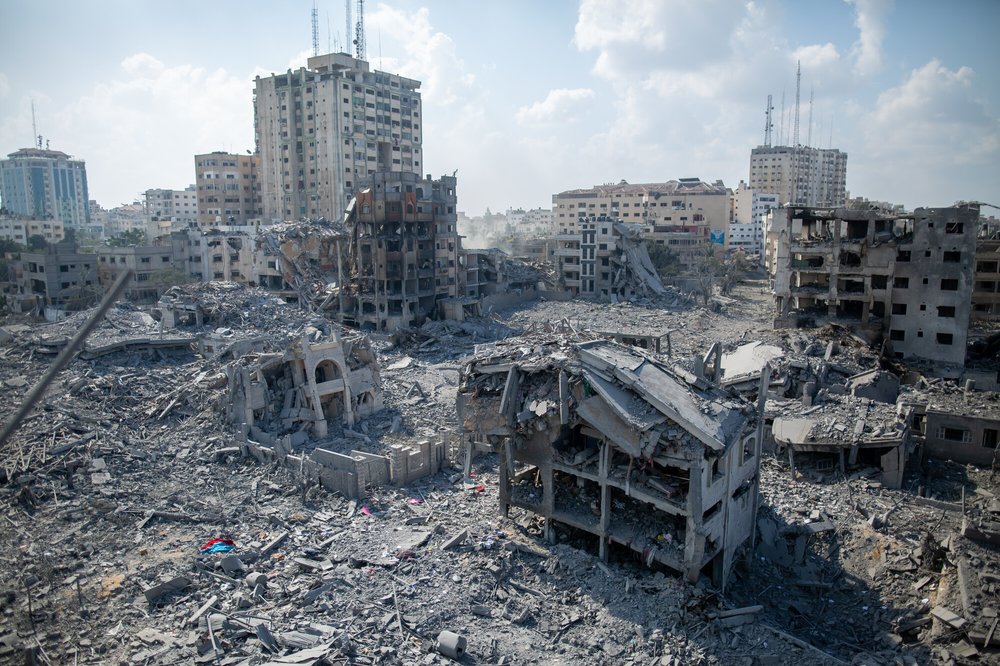
Since 7 October 2023, the situation in Gaza has not only caused an unprecedented humanitarian catastrophe but has also reignited major geopolitical tensions and laid bare the structural failures of international law and global governance.
In this context, ASF reaffirms the absolute necessity of protecting civilians and upholding international humanitarian law.
Beyond the massive violations committed by the Israeli government and army—which have led to the death of at least 60,000 Palestinians—this crisis reveals deeper systemic dynamics: the unequal media, legal and political treatment of grave human rights violations depending on who commits them. This double standard fundamentally undermines international justice and the universality of human rights.
Structural racism and dominant narrative
Any attack on civilians is a violation of international humanitarian law. Yet across most Western political and media institutions, the response to violence against Israeli civilians differs starkly from that to violence against Palestinian civilians—revealing a systemic double standard rooted in deep-seated structural racism.
The narrative imposed by Israeli authorities is widely echoed and rarely challenged by governments and mainstream media. Meanwhile, Palestinian voices and perspectives are largely absent from dominant discourses. Palestinian losses are too often reduced to anonymous statistics, framed as inevitable collateral damage—or worse, as a legitimate backlash. It should be noted that these narratives offer little historical framing and make little reference to, or even deny, the decades of oppression, occupation and colonisation suffered by the Palestinian people, even though these violations are corroborated by the United Nations and international NGOs.
This double standard held by political and media institutions is the effect of a deep-seated structural racism, which ranks human lives according to cultural, geopolitical or ethnic criteria. By systematically dehumanising some of the victims, they help to legitimise their murder and justify the impunity of the perpetrators.
International justice under pressure
As part of his mandate, the prosecutor of the International Criminal Court (ICC), Karim Khan, has requested arrest warrants for Hamas leaders, as well as for top Israeli officials, including Prime Minister Benyamin Netanyahu. These arrest warrants follow a complaint lodged by South Africa. It accuses Israel of violating the Convention on the Prevention and Punishment of the Crime of Genocide. This initiative highlights the leading role of certain countries in the Global South that have suffered the worst human rights violations in activism in favour of international justice. Through this complaint, South Africa is seeking to reaffirm that the law applies to everyone, without distinction, despite the complicit silence of European countries and the United States.
Despite being based on international law and the universality of human rights, this approach has met with virulent opposition from many ‘Western states’. In response, they have sought to discredit and obstruct the work of the ICC, as well as attacking the civil society organisations that work with the institution. Through their actions, these states are directly attacking the independence of international justice. In order to fulfil its mandate, the ICC depends on the willingness of countries to support its work and procedures, regardless of the individuals involved and the political and economic relations they may have with the perpetrators of these crimes. Allowing the ICC to investigate freely is a moral and legal imperative, essential to guarantee the legitimacy of the international system.
Impact on international law and global governance
The current crisis raises a fundamental question. When international institutions are weakened by political pressure or bypassed by allied powers, their ability to uphold human rights collapses. This dynamic is not only a tragedy for the Palestinian people: it erodes global confidence in international governance, fuels cynicism and paves the way for new forms of authoritarianism.
ASF warns of the danger of eroding the universality of rights. If some lives are clearly worth less than others in the eyes of the law, then the system loses all credibility. The crisis in Gaza, and the differentiated response to it, is thus becoming a revelation – but also a catalyst – of the wider crisis of multilateralism and global governance.



